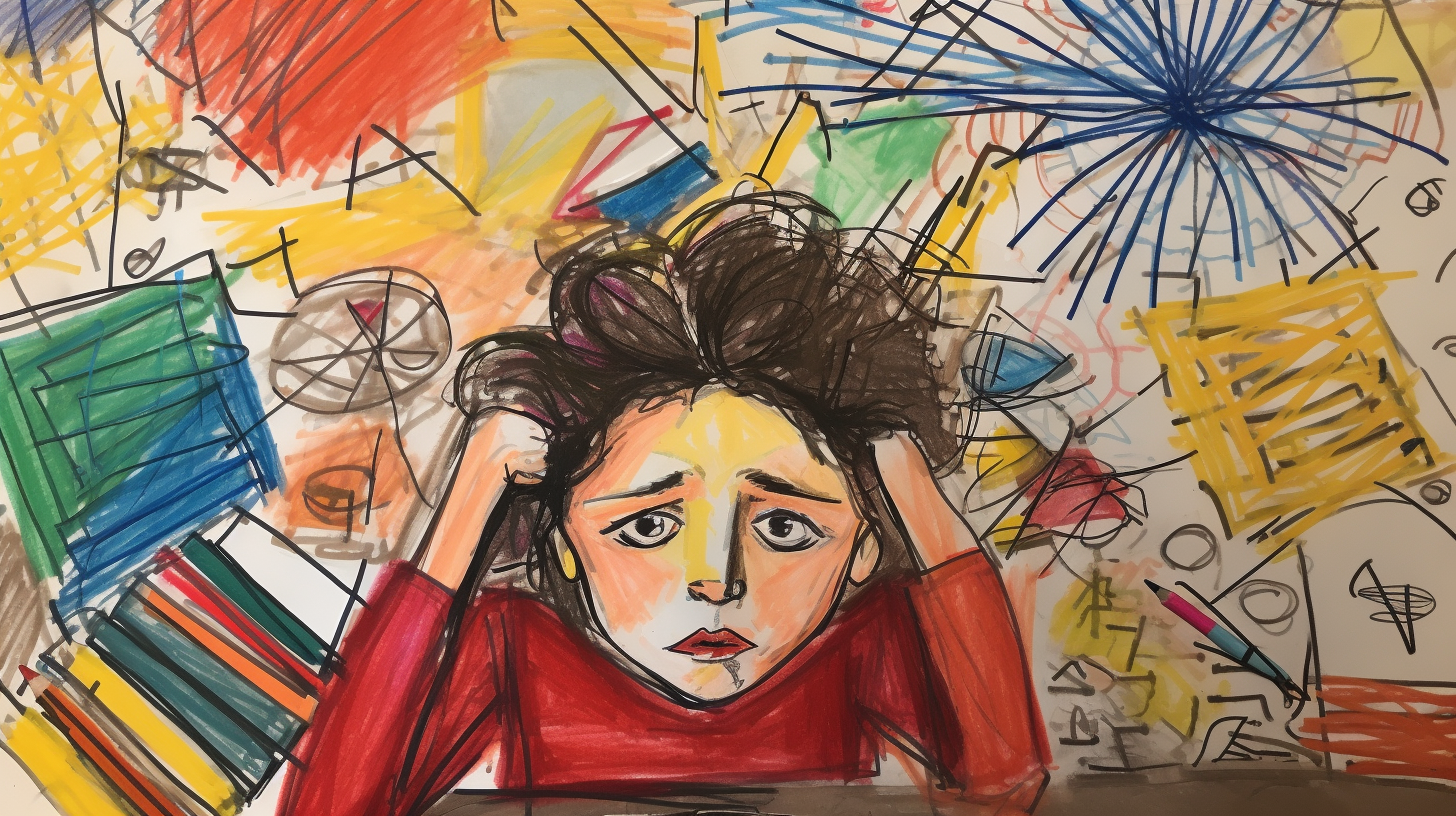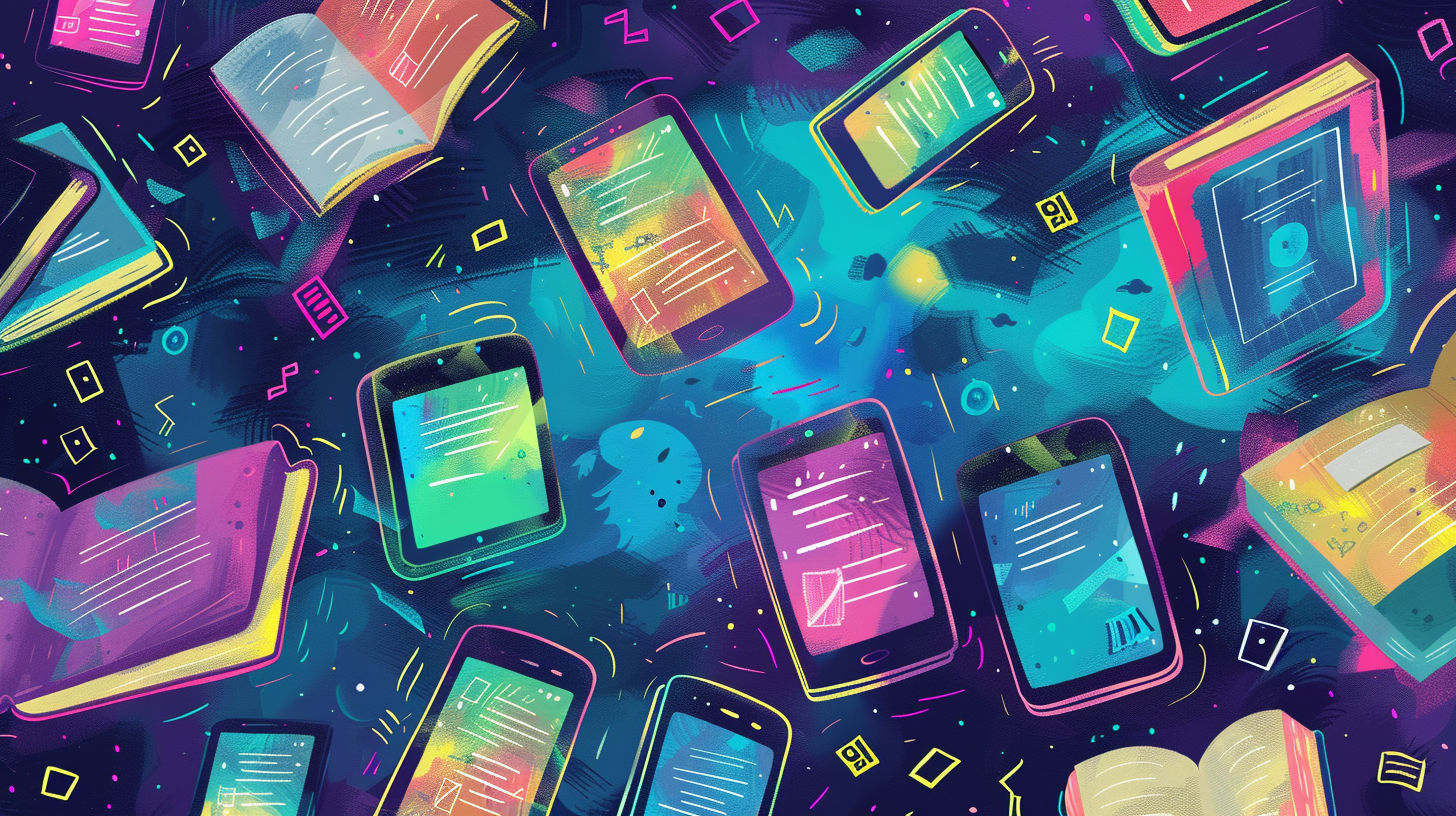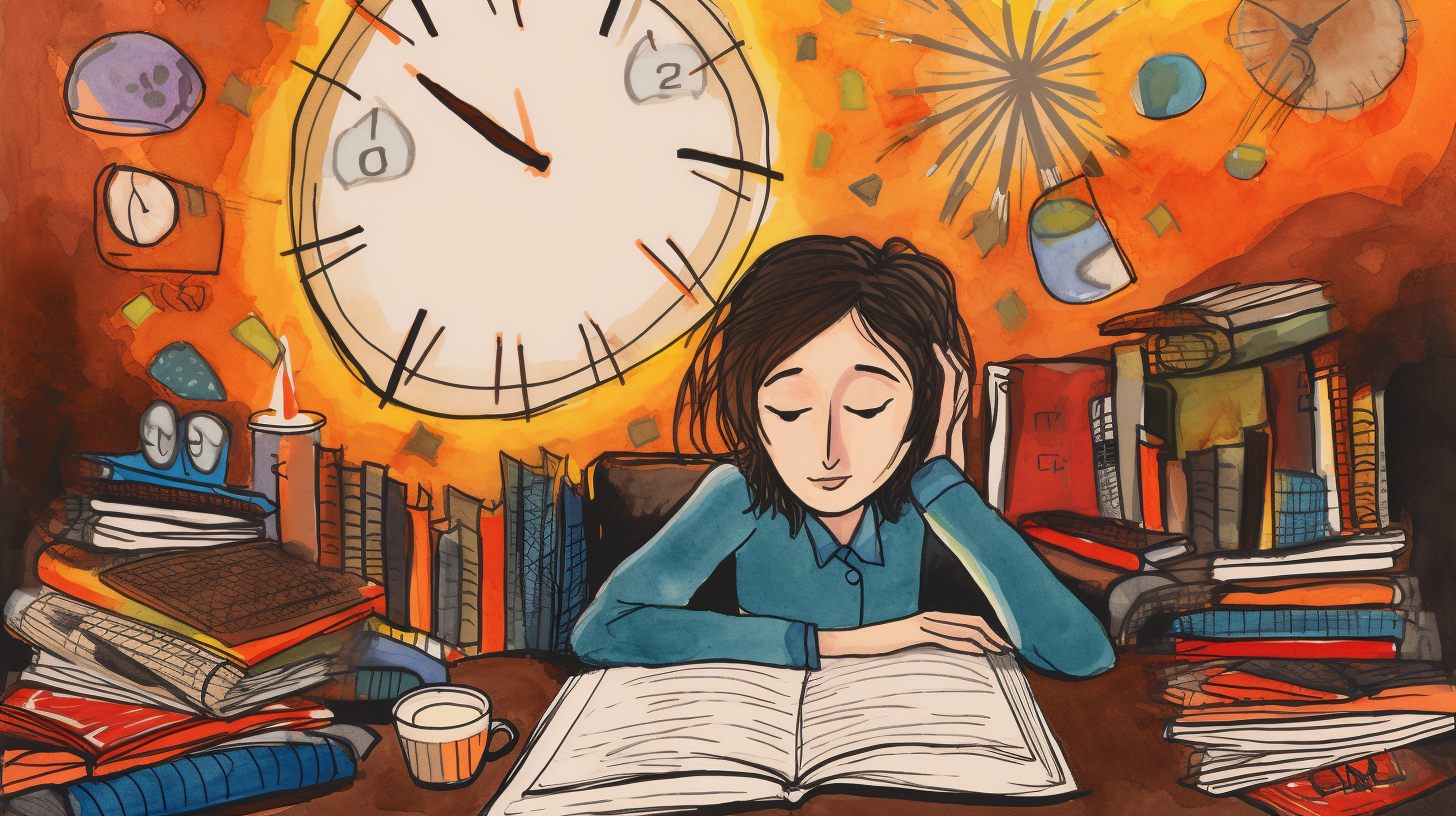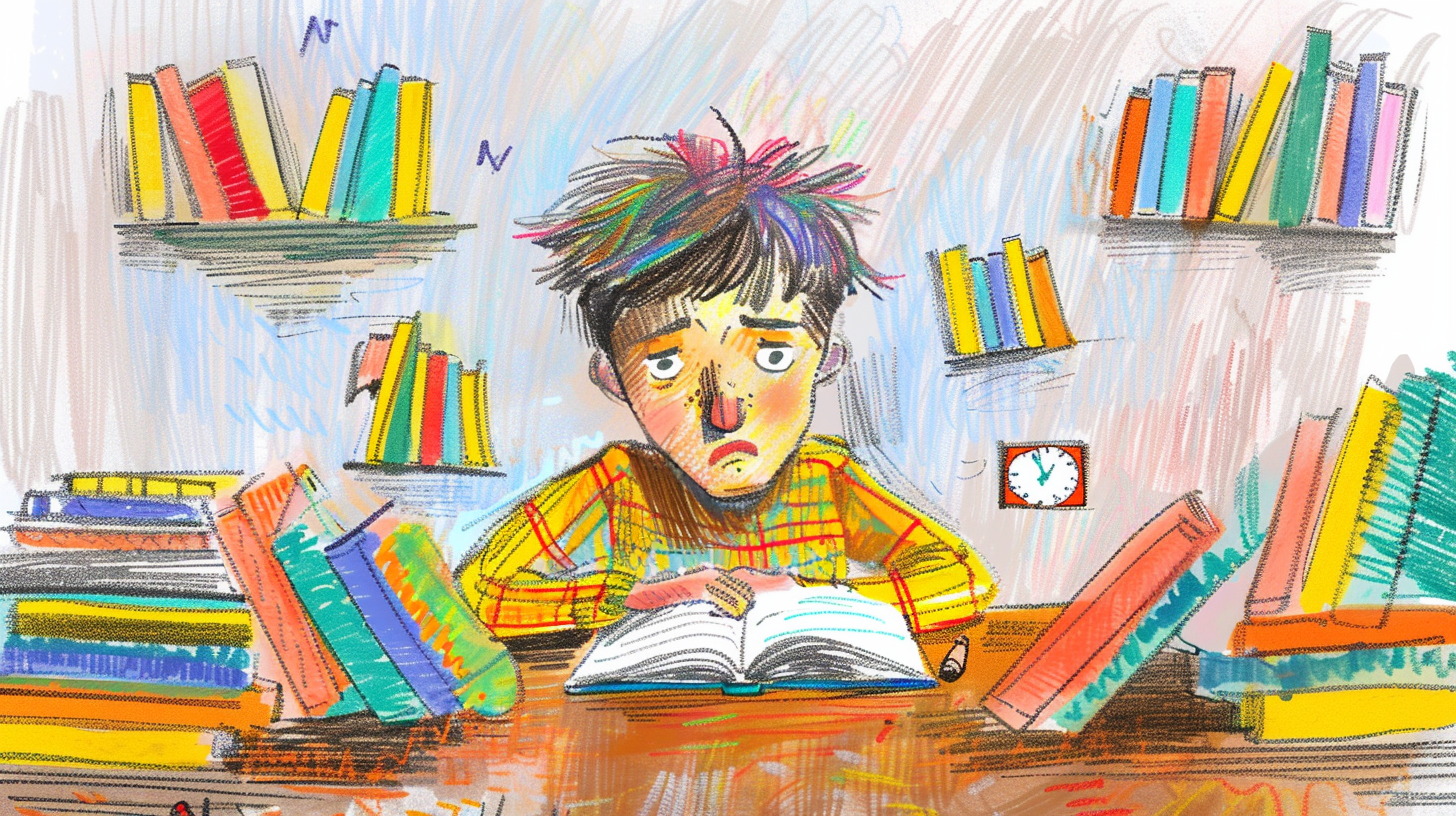Have you ever wondered, “Why do I get tired when I read?” It’s a common question with several factors at play. Reading, a seemingly simple activity, can surprisingly drain your energy, leaving you yawning after just a few pages. This article dives into the reasons behind this phenomenon, exploring various aspects that contribute to reading fatigue.
We’ll start by discussing why reading can be tiring, highlighting the role of eye strain in reading fatigue. Next, we’ll investigate how mental fatigue and reading comprehension are interconnected, followed by an examination of physical factors that contribute to reading fatigue. Finally, we’ll explore the connection between sleep and reading fatigue, offering insights into how relaxation and the release of melatonin might be making you sleepy. Join us as we unravel the mysteries behind your reading-induced drowsiness.
Why is Reading Tiring?
Ever wondered why does reading make you sleepy or why do I get tired when I read? Several factors contribute to the phenomenon of feeling tired or even falling asleep while reading. Understanding these factors can help you find ways to stay more engaged and less tired during your reading sessions.
Firstly, eye strain plays a significant role. Reading, especially in poor lighting, forces your eyes to work harder, leading to fatigue. Your eyes are involved in a constant micro-movement as they track each word, causing strain over time. If you often find yourself getting sleepy when reading, try adjusting the lighting or the font size on your digital device to reduce eye strain.
Secondly, the content of what you’re reading impacts your alertness. Material that you find uninteresting or challenging to comprehend requires more mental effort. This can quickly lead to mental fatigue, making it hard to focus and easy to succumb to sleepiness. When you catch yourself falling asleep reading, consider switching to lighter, more engaging material.
Also, mental fatigue from focusing on text for long periods can be exhausting. The process of decoding symbols (letters) into words and sentences that hold meaning is cognitively demanding. This prolonged mental activity without breaks can lead to a decrease in energy, making you feel tired or sleepy when reading.
Physical posture also contributes to why reading makes me sleepy. Sitting in the same position for too long, especially if it’s uncomfortable, can lead to physical fatigue. This is compounded if you’re falling asleep when reading in a position that encourages sleep, like lying down. Ensuring you’re in a comfortable, upright posture can help keep sleep at bay.
How to stay awake when reading? An effective alternative to traditional reading, which addresses many of these fatigue factors, is listening to audiobooks. Audiobooks can dramatically reduce eye strain and mental fatigue as they allow you to absorb content through listening, which is often less taxing than reading text. This can be especially beneficial if you get sleepy when reading or fall asleep while reading. Listening to a book instead of reading text allows you to relax your eyes and engage your mind in a way that’s different from visual reading, potentially keeping you awake and alert for longer periods.
The Role of Eye Strain in Reading Fatigue
Eye strain plays a significant role in why reading might make you feel tired or even cause you to fall asleep while immersed in a book. Understanding the impact of prolonged screen time and learning strategies to reduce eye strain can enhance your reading experience, pushing traditional reading boundaries and perhaps hinting at the convenience of audiobooks.
Impact of Prolonged Screen Time on Eye Fatigue
Extended periods of reading, especially on digital screens, can significantly contribute to eye strain, making you wonder, “Why does reading make me tired?” The harsh backlight and the constant focus required when reading digital content can exhaust your eyes. Symptoms may include dryness, blurred vision, and headaches, leading to the inevitable question, “Why do I get sleepy when I read?” This fatigue isn’t restricted to digital screens alone; even traditional reading under poor lighting conditions can strain your eyes. It’s crucial to recognize that both scenarios demand a lot from your eyes, often resulting in fatigue or falling asleep while reading.
Audiobooks emerge as a superior alternative in this context, as they eliminate the risk of eye strain. You can immerse yourself in the world of books without taxing your eyes, allowing for a more comfortable and sustainable reading (or, rather, listening) session. Why not switch to audiobooks if eye strain makes reading less enjoyable for you?
Strategies for Reducing Eye Strain While Reading
To combat eye strain and keep the sleepy feeling at bay, consider these strategies:
- Adjust Lighting: Ensure the room is well-lit while reading. Poor lighting forces your eyes to work harder, which can lead to fatigue. This tip is crucial, especially when wondering how to read without falling asleep.
- 20-20-20 Rule: Every 20 minutes, take a 20-second break and look at something 20 feet away. This simple strategy can minimize the risk of eye strain and help you maintain focus and energy.
- Increase Text Size: Whether you’re reading a physical book or an e-book, adjusting the font size to a comfortable level can reduce the workload on your eyes, making the reading process less tiring.
- Opt for Audiobooks: Incorporating audiobooks into your reading routine can be a game-changer. Audiobooks provide a break from eye strain, enabling you to enjoy literature without the associated fatigue. They’re perfect for those moments when you ask, “How do I stop feeling sleepy while reading?” or “How to stay awake when reading?” Audiobooks keep your mind engaged without the physical strain of reading, offering a compelling answer to why traditional reading might make you sleepy.
Mental Fatigue and Reading Comprehension
When you settle in with a book, the goal is to relax or learn, or perhaps a mix of both. But if you’re asking, “Why do I get tired when I read?” it’s time to investigate how mental fatigue and reading comprehension are closely linked.
Cognitive Load and Fatigue in Reading
The concept of cognitive load is crucial in understanding why reading can be so tiring. As you read, your brain is not just decoding symbols on a page or screen; it’s processing information, making connections, and often visualizing concepts. This mental labor is particularly intensive when you’re engaged in deep reading—such as studying or absorbing complex narratives—which can lead to cognitive fatigue. In other words, the more challenging the material, the more energy your brain expends, hence why reading makes you sleepy or why you might find yourself falling asleep while reading.
Audiobooks offer a fascinating solution to this issue. Listening rather than visually processing text can reduce cognitive load, especially for dense or challenging materials. This difference means you can enjoy longer reading (or, more aptly, listening) sessions without the accompanying mental fatigue. For those wondering how to read without falling asleep or how to stay awake when reading, transitioning to audiobooks for heavier materials might be the key.
Techniques for Improving Reading Stamina
Building your reading stamina is similar to improving any other skill: it requires practice, patience, and smart strategies. If you frequently find yourself getting sleepy when reading, here are a few techniques to consider:
- Break it Down: Instead of marathon reading sessions, break your reading into shorter, more manageable segments. This approach can help maintain high levels of comprehension without overwhelming your cognitive capabilities.
- Mix It Up: Integrate audiobooks into your reading routine. Not only do audiobooks allow you to rest your eyes, but they also let you engage with books in a more dynamically cognitive way, often enhancing your understanding and retention of the material.
- Stay Active: Simple physical activities, like walking while listening to an audiobook, can help keep drowsiness at bay and improve focus. This technique addresses the common question: How do I stop feeling sleepy while reading?
The shift towards understanding why does reading make me tired and leveraging strategies like audiobooks represent a more sustainable approach to reading and learning. Not only do audiobooks mitigate the risk of eye strain and cognitive overload, but they also make reading accessible in more situations—whether you’re commuting, exercising, or simply resting your eyes.
The key takeaway is that if you get sleepy when reading or studying, it’s not a personal failing but a signal that your current approach could use a refresh. Audiobooks could very well be the solution you’re searching for, offering a way to engage with stories and information without the eye strain or mental exhaustion commonly experienced with traditional reading.
Physical Factors Contributing to Reading Fatigue
Reading is a pursuit that enriches the mind, but often, you may find yourself battling fatigue. Understanding the physical factors contributing to reading fatigue is crucial in mitigating its effects. Let’s investigate how ergonomics and physical fitness play pivotal roles in your reading endurance.
Ergonomics and Reading Posture
Your posture while reading has a significant impact on how long you can engage with the material without feeling tired. When you ask, “Why do I get so sleepy when I read,” consider your physical stance. Slouching or lying down in bed with a book can lead to discomfort and strain, making your body exert more effort to maintain an inefficient position. This strain quickly translates to fatigue, often causing you to fall asleep while reading.
Adopting a proper reading posture can drastically change this experience. Ensure you’re seated in a chair that supports your back, with both feet flat on the ground. Keep your reading material at eye level to avoid tilting your head down, which puts strain on your neck and eyes. By optimizing your ergonomics, you not only avoid getting sleepy when reading but also enhance your focus and comprehension.
For audiobook listeners, ergonomics still matters. You’re free from the need to maintain a reading posture, offering a comfortable alternative without sacrificing the joy of stories. This shift can significantly reduce physical fatigue, allowing you to enjoy literature without the risk of falling asleep.
Importance of Physical Fitness for Sustained Reading
Physical fitness plays an unexpected yet crucial role in reading stamina. You might wonder, “How does my fitness level affect my reading habits, or why do I get so tired when I read?” Stamina and endurance are not just for athletes; they also apply to mental tasks. A higher fitness level promotes better blood circulation, ensuring your brain receives the oxygen and nutrients it needs to function optimally.
Incorporating regular physical activity into your routine can help enhance your focus and energy levels, making it easier to engage with reading materials for longer periods. By improving your physical fitness, you’re not just benefiting your body but also creating a more resilient mind that can withstand the rigors of reading without quickly succumbing to fatigue.
Switching to audiobooks can also be an excellent way to integrate reading into a more active lifestyle. Listening as you walk, jog, or work allows you to stay physically active while enjoying your favorite books. This combination of mental and physical engagement can dramatically reduce feelings of tiredness, making reading an energizing rather than a soporific activity.
Optimizing your physical conditions for reading, from posture to fitness, enhances your overall experience. Whether you’re immersed in a traditional book or an audiobook, understanding these physical factors equips you with the knowledge to tackle reading fatigue head-on, making each session more enjoyable and effective.
The Connection Between Sleep and Reading Fatigue
Lack of Sleep and Its Effects on Reading Performance
If you’ve ever wondered, “Why do I get sleepy when I read?” or “Why does reading make me sleepy?” the answer might be more straightforward than you think. A primary reason for feeling drowsy while engaging in reading activities is simply a lack of adequate sleep. Not getting enough rest can severely impact your reading performance, making it difficult to concentrate and process information effectively. This setback often leads to an increase in reading fatigue.
When you’re tired, your brain struggles to maintain focus, transforming the usually enjoyable activity of reading into an uphill task. This struggle can exacerbate feelings of tiredness during reading sessions, leading to scenarios where you might fall asleep when reading, even if the material is engaging. Audiobooks offer a solution by allowing your eyes to rest, reducing the strain that contributes to fatigue. Listening rather than reading can help mitigate the feeling of being overwhelmed by the written text, preventing the common occurrence of falling asleep while reading.
Tips for Establishing a Healthy Sleep Routine
Improving your sleep quality plays a crucial role in how to stay awake while reading. Here are practical tips for establishing a beneficial sleep routine:
- Set a Consistent Sleep Schedule: Go to bed and wake up at the same time every day to regulate your body’s internal clock.
- Create a Restful Environment: Make sure your bedroom is cool, dark, and quiet. Consider using white noise machines or blackout curtains to enhance the quality of your sleep.
- Limit Exposure to Screens Before Bedtime: The blue light emitted by screens can interfere with your ability to fall asleep. Switch to listening to an audiobook in the hour leading up to bedtime instead of scrolling through your phone.
Implementing these strategies can contribute significantly to reducing the chances of feeling sleepy when reading. Audiobooks serve as an efficient tool in this context, allowing you to absorb content without the physical strain of reading, which can be especially valuable when you’re trying to relax before bed. Transitioning to audiobooks during times when traditional reading makes you sleepy, or you find yourself falling asleep reading can rejuvenate your enthusiasm for stories without the accompanying fatigue.
By addressing the root of your tiredness, you stand a better chance of enhancing both your reading and listening experiences. Remember, whether you choose to read or to listen, the goal is to engage with the material fully and enjoyably. Making slight adjustments to your routine and incorporating audiobooks into your life can make a noticeable difference in how you consume literature and learn new information, ensuring that you’re getting the most out of your reading time, awake and alert.
Conclusion
Understanding why you get tired when you read is key to improving your overall reading experience. By acknowledging the impact of eye strain, mental fatigue, and the crucial role of sleep, you’re equipped to tackle these challenges head-on. Implementing strategies like adjusting screen time, embracing audiobooks, and establishing a healthy sleep routine can make a significant difference.
Remember, it’s not just about reading more but about enjoying the process without feeling drained. With these insights, you’re on your way to a more enjoyable and sustainable reading journey.
Frequently Asked Questions
How can I avoid getting tired while reading?
To prevent tiredness while reading, consider taking regular breaks, ensuring adequate lighting, and maintaining an upright posture. Avoid reading in your bedroom to prevent associating the space with sleep. Stay hydrated, eat healthy snacks, and make reading an active task by taking notes or discussing content with friends.
What are the symptoms of reading fatigue?
Symptoms of reading fatigue include a sense of disillusionment or burnout from academic pressure, marked by a lack of motivation, general apathy towards reading tasks, anxiety, and irritability. It is The emotional and cognitive toll taken by extensive reading demands.
What is reading burnout, and how can I overcome it?
Reading burnout occurs when you lose interest in reading, struggle to pick a book, or can’t find the time or inclination to read. Overcoming reading burnout can involve mixing up your reading materials, setting small, manageable reading goals, or engaging in group reading activities to reignite your interest.




